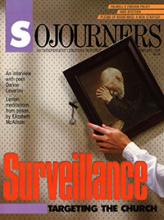In late April I picked up the phone, and a radio news reporter asked me why my husband, Bill Kellermann, and I had supported the national April 29 "No Business As Usual" demonstration. I told her we hadn't but that I could give her the names of some people who had. Instead she told me that she had just talked to the people at Selfridge Airbase and they'd given her our number. She added that officials at the air base had been very concerned about the day of protest and had even called in the Reserves. Apparently they thought it was possible that the air base itself might be attacked, and they connected us to that threat.
We were troubled. Bill and I had given a lot of thought to whether we could support the April 29 protest. A lot of good people had supported it. But the literature for the protest essentially called for a national strike to protest nuclear weapons, saying they must be stopped "no matter what it takes." We couldn't support the last clause and neither could the Detroit Peace Community, so we disassociated ourselves from the protest. Or at least we thought we had.
Read the Full Article

